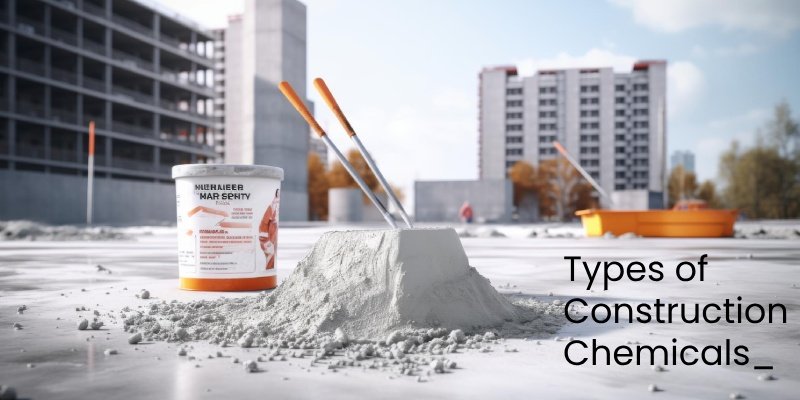Types of Construction Chemicals: Benefits and Applications
Construction chemicals play a crucial role in modern construction practices, offering a wide range of benefits and applications. From enhancing durability to improving aesthetics, these chemicals have become indispensable in the construction industry. In this article, we will explore the various types of construction chemicals, their benefits, applications, and future trends.
Understanding Construction Chemicals
Construction chemicals consist of a wide range of materials added to concrete, mortar, and other construction materials to enhance their properties. These chemicals aim to improve the performance, durability, and workability of construction materials, ultimately resulting in better-quality structures.
Benefits of Using Construction Chemicals
The use of construction chemicals offers several benefits, including:
- Increased Durability: Enhancing the durability of structures, prolonging their service life and reducing maintenance costs.
- Enhanced Strength: Improving the properties of concrete and mortar, increasing the strength and load-bearing capacity of structures.
- Improved Aesthetics: Certain chemicals, such as decorative coatings and surface finishes, enhance the aesthetic appeal of buildings and structures.
- Reduced Maintenance Costs: Preventing damage and deterioration, reducing the need for costly repairs and maintenance.
- Enhanced Safety: Improving the fire resistance, slip resistance, and seismic performance of structures, enhancing overall safety for occupants.
- Environmental Sustainability: Some are formulated with eco-friendly ingredients and technologies, reducing environmental footprint and promoting sustainable construction practices.
- Cost Savings: This leads to cost savings in the long run by increasing the lifespan of structures, reducing energy consumption, and minimizing repair and replacement expenses.
Types of Construction Chemicals
Let’s explore different types of Construction Chemicals:
1. Cementitious Materials

Cementitious materials, such as cement additives and mineral admixtures, are commonly used in construction to modify the properties of concrete and mortar. These materials can enhance strength, reduce permeability, and improve durability.
2. Admixtures
Admixtures are additives that are mixed with concrete or mortar to alter its properties. Common types of admixtures include water reducers, accelerators, retarders, and air-entraining agents. These chemicals help improve workability, reduce water content, and accelerate or delay the setting time of concrete.
3. Waterproofing Compounds
Waterproofing compounds are applied to concrete and masonry surfaces to prevent water penetration. These compounds form a protective barrier that prevents moisture ingress, reducing the risk of corrosion, mould growth, and structural damage.
4. Protective Coatings

Protective coatings, such as epoxy and polyurethane coatings, are used to protect concrete and steel surfaces from corrosion, abrasion, and chemical attack. These coatings provide a durable and long-lasting barrier against environmental factors.
5. Repair and Rehabilitation Products
Repair and rehabilitation products are used to repair and restore deteriorated concrete structures. These products include concrete repair mortars, grouts, and sealants, which help extend the service life of existing structures.
6. Flooring Materials
Flooring materials are construction chemicals designed for various types of flooring, such as epoxy flooring, self-leveling compounds, and decorative overlays. These materials provide durability, chemical resistance, and aesthetic appeal to floors in residential, commercial, and industrial settings.
7. Sealants and Caulks
Sealants and caulks seal joints and gaps in construction materials, preventing water intrusion, air leakage, and heat loss. Builders commonly apply these materials in roofing, windows, doors, and concrete joints to enhance buildings’ weather resistance and energy efficiency.
Benefits of Using Construction Chemicals
The use of different types of Construction Chemicals offers several benefits, including:
- Increased Durability: Enhancing the durability of structures, prolonging their service life and reducing maintenance costs.
- Enhanced Strength: Improving the properties of concrete and mortar, increasing the strength and load-bearing capacity of structures.
- Improved Aesthetics: Certain chemicals, such as decorative coatings and surface finishes, enhance the aesthetic appeal of buildings and structures.
- Reduced Maintenance Costs: Preventing damage and deterioration, reducing the need for costly repairs and maintenance.
- Enhanced Safety: Improving the fire resistance, slip resistance, and seismic performance of structures, enhancing overall safety for occupants.
- Environmental Sustainability: Some chemicals are formulated with eco-friendly ingredients and technologies, reducing environmental footprint and promoting sustainable construction practices.
- Cost Savings: This leads to cost savings in the long run by increasing the lifespan of structures, reducing energy consumption, and minimizing repair and replacement expenses.
Applications of Construction Chemicals
Construction chemicals find applications in various sectors, including:
- Residential Construction: Enhancing the durability and aesthetics of buildings, as well as improving the comfort and livability of living spaces.
- Commercial Construction: Meeting stringent performance requirements and enhancing the longevity of structures.
- Infrastructure Projects: Playing a vital role in infrastructure projects such as bridges, highways, and tunnels, where durability and performance are critical.
- Industrial Facilities: Providing chemical resistance, abrasion resistance, and anti-static properties to floors, walls, and structures.
- Water and Wastewater Treatment: Used in water and wastewater treatment facilities to protect concrete and metal structures from chemical attack and deterioration.
- Historical Restoration: Employed in historical restoration projects to repair and preserve aging structures, ensuring their longevity and historical significance.
- Sports and Recreational Facilities: Providing slip resistance, impact resistance, and waterproofing properties to surfaces in sports stadiums, swimming pools, and recreational facilities, ensuring safety and durability.
Challenges and Considerations
Despite their numerous benefits, the use of construction chemicals poses certain challenges and considerations.
These include:
- Compatibility with Other Materials: They must ensure optimal performance and durability by being compatible with other construction materials.
- Environmental Impact: Some chemicals may have adverse environmental effects, such as air and water pollution. It is essential to consider the environmental impact of these chemicals and explore more sustainable alternatives.
- Proper Application Techniques: Proper application techniques are crucial to the effectiveness of these chemicals. Improper application can lead to reduced performance and durability of structures.
Future Trends in Construction Chemicals
The future of construction chemicals lies in innovation and sustainability.
Key trends in the industry include:
- Innovations in Sustainable Materials: There is a growing demand for sustainable construction materials that minimize environmental impact and promote energy efficiency.
- Advanced Formulations for Specific Applications: Manufacturers are developing advanced formulations tailored to specific applications, such as high-performance concrete for critical infrastructure projects.
Conclusion
We have provided a guide on Types of Construction Chemicals. They play a vital role in modern construction practices, offering a wide range of benefits and applications. From enhancing durability to improving aesthetics, these chemicals contribute to the creation of high-quality, long-lasting structures.
Unique FAQs
Are construction chemicals safe for use in residential buildings?
Yes, they are safe for use in residential buildings when used according to manufacturer guidelines. They undergo rigorous testing to ensure their safety and effectiveness.
Can you use the construction chemicals to repair existing structures?
Yes, manufacturers specifically design many chemicals for repairing and rehabilitating existing structures. These products help extend the service life of buildings and infrastructure.
Do construction chemicals have any environmental impact?
Some of them might pose environmental implications, especially when they contain hazardous ingredients or undergo improper disposal. However, the industry is increasingly focusing on developing more sustainable alternatives.
How can I ensure the proper application of construction chemicals?
It is essential to follow manufacturer guidelines and recommendations for the proper application. This includes preparing surfaces correctly, using the right equipment, and adhering to safety precautions.
What are some examples of advanced construction chemical formulations?
Examples of advanced construction chemical formulations include self-healing concrete, ultra-high-performance concrete, and eco-friendly coatings made from renewable materials.





